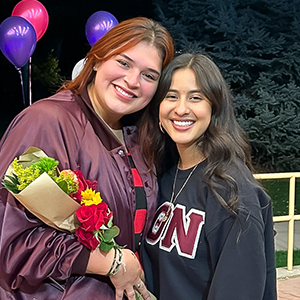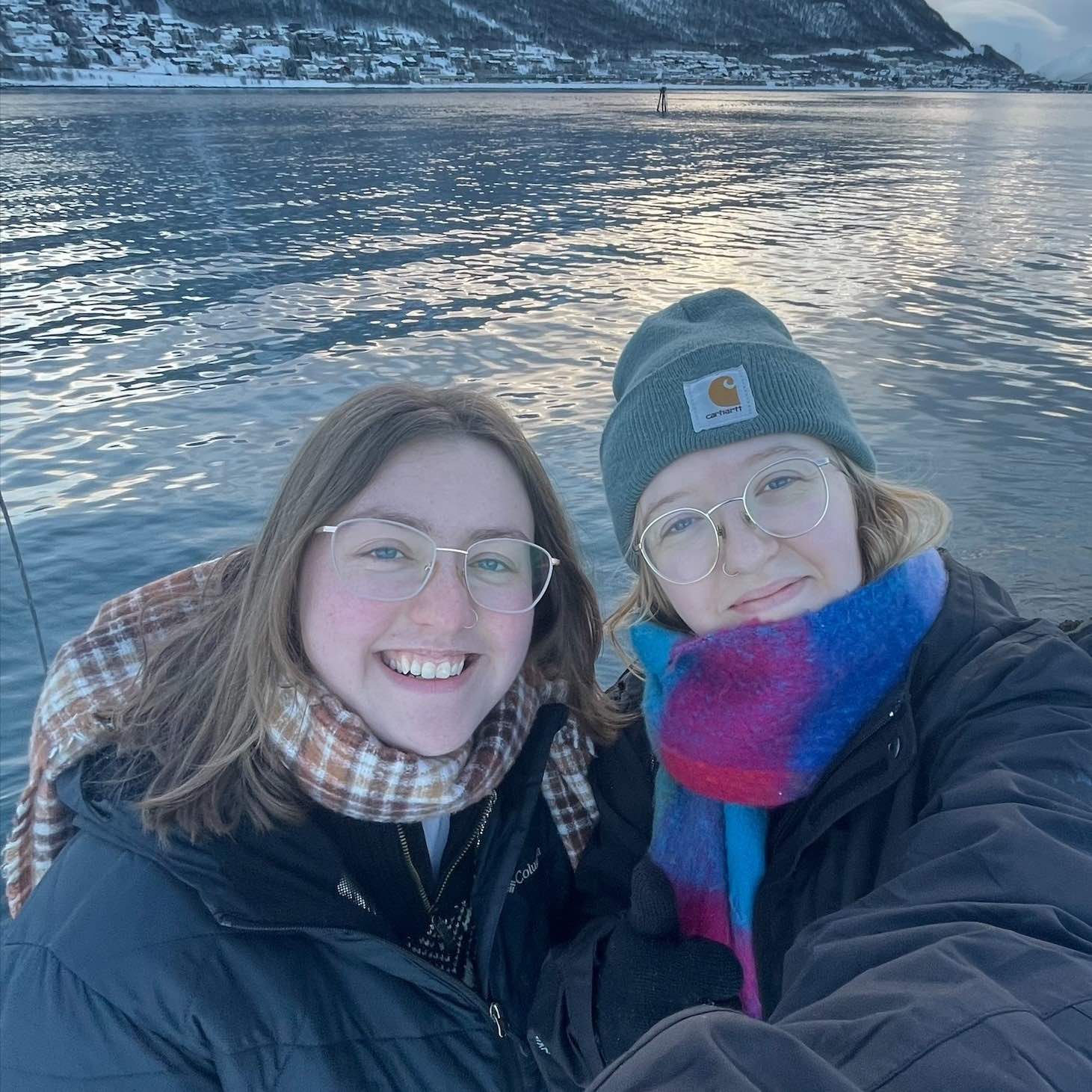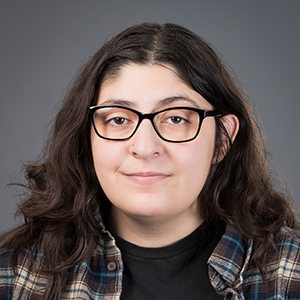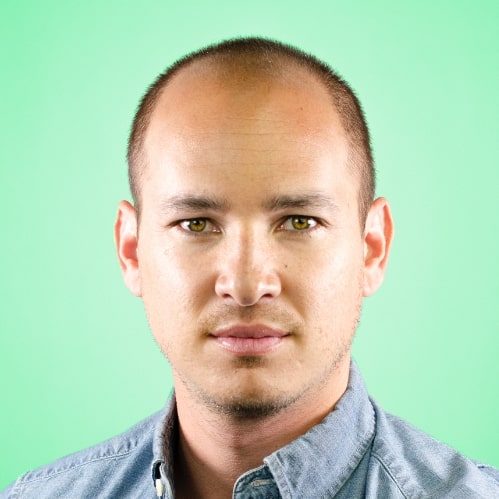
UNC students Ailin Amaro Martínez and Diana Muñoz talk with Katie about co-directing the Latina Youth Leadership Conference. They share about the anniversary of the conference, its relevance nationwide, their own experiences, and why representation is so important! (Running time 12:52)
RELATED: Celebrating 25 Years of Empowering Young Latina Women at UNC and Across the Nation
Transcript:
Katie: Hi everyone. Welcome back to this week's episode of The Bear in Mind Podcast. I'm your host, Katie Nord. Let's get started. For those who don't know, every March we celebrate Women's History Month. In the past, there were amazing women such as Amelia Earhart, Frida Kahlo, and Rosa Parks. And now there are so many more wonderful women who have made a huge impact on the world. Malala Yousafzai and Simone Biles, Beyonce, you name it. We've made strides for women's advocacy and representation around the world on a large scale and a small scale. Today we have two wonderful women joining us, Ailin Amaro Martinez and Diana Munoz, to tell us about their conference that offers representation to young latinas in the community as well as teaches about leadership, culture, empowerment, and so much more. Thank you for joining me today.
Ailin: Thank you for having us.
Diana: Yeah. Thank you.
Katie: First off, I'll just have you both introduce yourselves. You can tell us your name, your year here at UNC, your major, your position in your sorority and anything else you'd like us to know.
Ailin: My name is Ailin Amaro Martinez. I am a senior this year. I'm a business management major with a minor in entrepreneurship. I have various positions, but I am the co-director of this year's Latina Youth Leadership Conference.
Katie: Awesome.
Diana: I'm Diana Munoz. I am a senior. I'm a music major with a minor in elementary education. Same thing. I have various positions in the sorority, but I am the other co-director for LYLC this year.
Katie: Have you guys been in your sorority all four years?
Ailin: We have not. We actually crossed together.
Katie: Oh, cool.
Diana: Yeah, we crossed last fall.
Katie: What's the name of your sorority?
Ailin: Lambda Theta Nu Sorority Incorporated, and we at UNC are the Kappa chapter.
Katie: Awesome. I know nothing about sororities, but that is so fun. You guys do a lot of community service and stuff like that around the community, so I know that's really cool. So since you guys are co-directing the conference, could you tell us a bit about what the Latina Youth Leadership Conference is? What do you guys do and how it first started to grow into what it is now?
Diana: The Latina Youth Leadership Conference is a conference that is catered specifically to eighth grade girls who are going into high school. It's kind of a way to ease that transition from middle to high school. So typically with the conference, we have a keynote speaker which transitions into four workshops that happen throughout the day. Our workshops are between four themes, one being self-esteem, cultural awareness, leadership and education.
Ailin: Kind of to build off of that this year is really special to us because it's our 25th annual. This conference was started by our founding sisters here at Kappa Chapter. At first it was catered towards high school students just because specifically in the district six county, there was a high dropout rate in high school Latinas, and they wanted to feel more connected to the community. So they chose to host this conference. And it is something that our organization holds very dear to our hearts. And now it is also something that our other chapters across the country do as well.
Katie: That's really cool. So it's a nationwide thing now? It is. That's amazing. And this is a big conference. It's definitely grown from what, 25 years ago now?
Diana: Yeah, it started off here at UNC. We were the first chapter to create it and get it started. And then because of that big influence, then it became a requirement across all of our other chapters. But our chapter here in Greeley continues to be the biggest conference.
Katie: Wow. That's awesome. Congratulations.
Diana: Thank you.
Katie: It must be a lot of pressure running this whole thing too.
Diana: It is. Yeah. We have a lot of alum and older generations come in. They also really love this conference and it just continues to be an annual thing where all of our sisters come back. It's a little pressure, but it's also a lot of fun.
Ailin: It is really special for us to just to hold that with our sisters.
Katie: Yeah, and get as much help as you need.
Ailin: Yes.
Katie: It is a big event. I'm sure you need as much as you can get. What inspired you to want to take over as co-directors?
Ailin: We both attended the conference as eighth graders. I went to a university middle school at the time and it was or is a predominantly white institution. So connecting with people who had similar backgrounds as me was difficult. Going to that conference and just having that space and community, it was really special for me. It was definitely a memory that I had and keep very close to my heart. And so now being a part of the organization who puts it on every year and being able to influence and inspire other middle school students is really special. And I I'm very proud of the work that we're doing.
Katie: That's amazing.
Diana: Yeah, I'm kind of the same way. I went to Frontier Academy, which is right beside her school. Our schools are kind of like rivals, so we attended the same year and my older sister is also a Lambda. She is from CSU, so I knew about the conference through her and she was also co-director when she was in school. It's just been really special to kind of follow in my sister's footsteps.
Katie: Yeah, it's such a surreal experience to go from participating in the conference and being a young girl and seeing all these wonderful people working so hard and inspiring you. And then you get to be the person who's passing down that knowledge, which is really, really cool.
Ailin: It's definitely full circle for us.
Katie: Oh my gosh, I bet you can also share that memory with your sister as well. What events usually take place at the conference?
Diana: So to kind of lay out the day for sisters and volunteers, anyone who's getting there, we get there really early just to help set up and get everything kind of laid out. And then once the schools arrive around like 8:30, 9:00, then we start checking them in, they'll get their bags, they'll get their shirts, and then they'll have a continental breakfast for all of the students, mentors, volunteers. And then once everybody is checked in, then we go into the ballroom, they get their seating. Then we start off with our keynote speaker, and then after that is when they split off into those workshops. We have different groupings for all the schools. So that way, you know, not one workshop gets like overcrowded, overloaded with a bunch of girls. That is the majority of the day is those workshops. Then after the workshop, we'll have lunch, and then during lunch we have our entertainment, which for this year is going to be a little different just because it is our 25th annual. So for this year, we're having to kind of start off the entertainment. We're having the Latin ensemble, the Latin string ensemble. Oh, wow. Yeah, that Latin music program is brand new. It's the only Latin music program in the world, which is really exciting. And then afterwards we're going to have some stroll performances. This year is going to be a little different, because we're having our alum perform and stroll with us to one of our songs that are very near and dear to our heart. You'll be able to see the different generations of lambdas strolling to the song.
Katie: And just for those who don't know, kind of including me, what is strolling?
Ailin: Stepping and strolling originated from nationally historic African American Greek organizations, also known as Divine Nine. Stepping and strolling is something that they hold very deep into their heart. It's a part of their culture. Every time we step and stroll, we thank the Divine Nine organization for paving the way for organizations like ours to express who we are. And that's a little bit about stepping and strolling. Yeah.
Katie: That's awesome. So what were some events you did years prior? So we know just how many things that your group has done.
Ailin: Last year I coordinated the choreography, if you will, and it was a machete at the performance as well.
Katie: Oh wow.
Ailin: A machete is one of our symbols in the sorority. Typically it's seen as something that's male dominated, a male weapon. But we chose to rebrand this as a form of our strength and our endurance. They were dulled, of course, very safe. We practiced with them and we had that for last year.
Katie: That's amazing. Did you get to keep the machete?
Ailin: Oh, yes, yes we did.
Katie: Do you have it hung up?
Ailin: I do!
Katie: You'll have to show me a video of your machete performance.
Ailin: I could definitely do that. I still have it.
Katie: Really? Oh, I'm so excited. That's so cool. Do you get to decorate them however you want to?
Ailin: They are supposed to be uniform and they were uniform, so we would just hit them on cement to dull them, do what we got to do. But they they do look pretty plain. After the performance though, we can decorate them.
Katie: It's a nice momentum for the occasion. That's awesome.
Diana: Yeah, we do have some sisters who actually engrave of the medal, which I think is really cool. I think we have not been able to do that. And my older sister, she has a pair of machetes and hers are engraved so beautifully and I'm like, well, mine are just from Walmart.
Katie: I didn't know you could buy a machete from Walmart. .
Diana: Yeah. .
Katie: That's crazy.
Diana: They're really cheap too.
Ailin: They were affordable.
Katie: They're in budget. Are there any big differences to celebrate the 25th annual conference compared to the previous years?
Diana: Yeah, we have a few things in place, a main one being that Latin ensemble coming in to perform. We also have our t shirts that we're giving out, the girls. We kind of brought back the old theme from when we were in eighth grade. So when we were in eighth grade, we got black shirts with silver lettering and the design was in silver, so we kind of brought that back another big circle moment for us. So we were planning to bring in this big display cake that's going to be decked out in silver. And then we're also having mini cupcakes for every single girl who attends.
Katie: That's so cute. .
Diana: Yeah.
Katie: I love that they get a shirt too.
Ailin: Yeah the shirt has a logo for this year, which was actually created by my best friend. She's an artist. Her name is Jayden Vallejo. She took the time to really create something that we all identified with, and she gave us this beautiful logo that we have on the shirts and that we'll have displayed the day of the conference.
Katie: I love that. With the four events that the girls can attend, what are the categories that they fall under?
Diana: It's self-esteem, leadership, education and cultural awareness.
Katie: And what are the girls learning during these workshops?
Ailin: So for the workshops for the educational one, it will be a panel. It'll be a panel of a high school student, some current college students and some alumni kind of how their journey went. All of these women are women of color who graduated against all obstacles, who persevered. Then the girls will be able to ask any questions they want that they're curious about. I was actually a part of the panel last year, and it was really special just being able to answer the questions that I had when I was their age. As well for the cultural awareness. We just want to make sure that these girls are proud of wherever background they are from, to feel confident in who they are and to feel represented. That's definitely the goal in this workshop. And then for self-esteem again, there are eighth grade girls, very young, very impressionable. I remember at that time it was hard. Middle school is hard. I would arguably say harder than high school. So we just want to make sure that they feel confident in who they are. And then lastly, for our leadership workshop, we just want to make sure that they feel confident going into the corporate world, wherever they may be. Whatever career choice they go into feel as though they can achieve anything.
Katie: I couldn't agree more. That is so exciting. Middle school was hard, especially for a young girl. And you want to make friends and you want to make a good impression, and you want all of the girls to think that you're cool. I completely agree, it's hard. It's scary too, Especially these girls are in eighth grade and they're going into high school. It's good that they're starting off with a good foot and they're confident and they can be leaders and all of that. Do either of you have a favorite memory from participating in the Latina Youth Leadership Conference in the past years? And then what was your favorite thing about the conference overall?
Diana: That one's hard. I think the first thing obviously that comes to mind is actually participating in the conference. When I was in eighth grade, just coming from a school that was predominantly white, I feel like this conference was really the only time I ever felt represented or even seen. I remember our group that came. It was maybe a group of five girls, my middle school. We really just did not have Latina women, so it was just a little group of five of us and we all were just really bonded. Obviously left a big impact enough for me to continue on and then join the sorority once I continued in college.
Ailin: I think I have two. The first one is probably being able to be a part of the performance during lunch and seeing the girls reactions, they were hyping us up. It was nice, especially with the machetes or the machetes and just seeing all the hard work because it takes months of practicing. We had some wonderful alum perform with us as well. They work, you know, were students, they took the time to be a part of the performance, and just seeing it come to fruition was really beautiful for me. And then I mentioned I was a part of the educational panel, just being able to answer those girls questions. And the best way I knew how. Giving them resources. Scholarships are available. Higher education is available no matter what your family income may look like. I know that is something I was really worried about when I was contemplating college. How am I going to pay for it? And luckily my older sister, she's an alum. Actually, she's a sorority sister and my biological sister. Her name is Ashley. She influenced me to see how it was possible, just because our parents didn't know anything about Fafsa, about registering. She helped me through all of that, and so I felt like I was able to help those girls who asked me those questions feel a little bit more confident in going to whatever path they may choose. But for the girls who are interested in college and feeling more confident that they could do that.
Katie: Yeah, and I'm sure having all of that security in those confusing times and not knowing how to go about high school and college, it's confusing. It's scary. But it's good to know that there are people that can help you and really be a good support system to lean on. What do you believe is so important about representation for young latinas and young women in general?
Diana: I think the biggest thing is just knowing that we're out there. I think it's hard being not only just part of this minority group. You're kind of facing all of these obstacles. You know, there may be people telling you you can't go into college, you can't get a higher education. You're just going to be forced to go into the work field. But being first gen, being a part of that minority group and then being able to not only see other first gen students accomplish that degree, really going into whatever career they would want. I think it's just so important to have these role models specifically influence the younger generations. I think something that we've been talking about a lot is that the youth is our future, and it's important for us to educate them.
Katie: Yeah.
Ailin: She said. It's so perfectly. Sometimes I joke about it. I don't get along with my little cousins all the time. But no, the youth is so important. They're the ones who will be making all these amazing decisions about our future. We just want to make sure they feel represented.
Katie: Yeah. And whether it be in real life or in media, these young girls are going to look up and see these strong, powerful, latina women who are doing so many wonderful things with their lives and in their community, and they're going to say, wow, I want to do that. And I think that is amazing.
Diana: Yeah, I agree, I think there's also a big pressure where, you know, these latinas want to go into higher education. They kind of feel obligated to choose very money focused careers where it's like, if I'm not going into the medical field or anything that's going to bring me big money, then I shouldn't even pursue a higher education. I think it's so important to emphasize that you can go into any career. I know my biggest worry going into the school of music, having those influences around me, telling me, why are you getting a music career? Like you're not going to make that much money out of it, but it's really just important going after the career that you choose and what you're passionate about.
Katie: Yeah, teaching these young girls to follow their dreams and follow their passions, no matter what people may pressure them to do, or society may make them feel like they are obligated to follow. That's really, really amazing.
Diana: Yeah.
Katie: Could you tell us when and where this will take place?
Ailin: The conference this year is going to be April 5th, from 9 a.m. to 2 p.m. here at the University of Northern Colorado, specifically in the UC. It's going to be on the second floor in the ballroom and in the suites. And if you want to reach out to anyone with any questions, you can either reach out to me or to Ailin. Our email is kappa.lylc86@gmail.com.
Ailin: Yeah, We are still looking for some volunteers and mentors too, and that could be found on our Instagram. And that is Kappa_lambdas. It is in our bio. Anyone could just click and link in and register. We are hosting this conference in collaboration with the Cesar Chavez Cultural Center. Every week we have our committee meetings where amazing people come in and help us plan everything. We are so grateful for them, and we are also very grateful for our sponsors and all the donations that we received for the conference.
Katie: Beautiful! I can't wait to see the success from this conference, and I'm so excited to see it grow even bigger in the future. This is such a wonderful event that provides a safe and educational space for so many young latina girls, and it's being run by these two amazing women. So congratulations you two as well. Just as a reminder for anyone interested in attending the event, it'll be taking place on April 5th, 2024 at the UC center from 9 a.m. to 2 p.m.. For those who want to learn more about the Latina Youth Leadership Conference or about Lambda Theta Nu Sorority Incorporated, you can email Kappalylc86@gmail.com. Thank you for joining me today, and thank you for listening to this week's episode of the Bear in Mind Podcast. I'm your host, Katie Nord, signing off.





